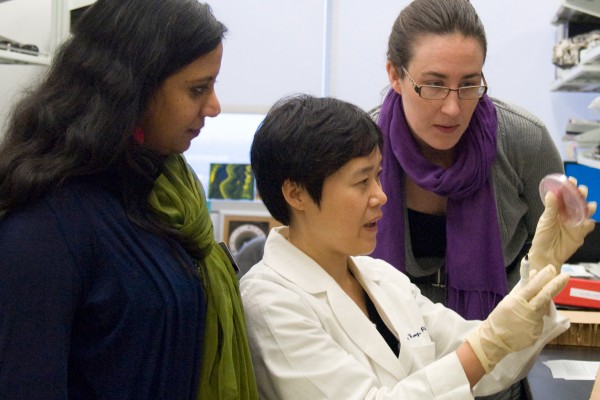WUSTL flag at half-staff in memory of Todd Wasserman
Todd H. Wasserman, MD, professor emeritus of radiation oncology at Washington University School of Medicine in St. Louis, died Tuesday, Jan. 22, 2013, after a prolonged illness. He was 66. An obituary will appear in an upcoming issue of the Record.
Annual art show opens Jan. 22
The School of Medicine’s 9th Annual Art Show opens Jan. 22 and runs through Feb. 17 at the Farrell Learning and Teaching Center atrium.
Schlaggar honored for pediatric research
Bradley L. Schlaggar, MD, PhD, the A. Ernest and Jane G. Stein Professor of Neurology at Washington University School of Medicine, has been awarded the E. Mead Johnson Award for Pediatric Research. The award is among the most prestigious in pediatric research.
Estrogen fights urinary infection in mouse study
Estrogen levels drop dramatically in menopause, a time when the risk of urinary tract infections increases significantly. Researchers at Washington University School of Medicine in St. Louis
have found new evidence in mice that the two phenomena are connected by
more than just timing.
Road construction along medical campus to begin
A road- and bridge-construction project that will impact Washington University, and particularly the medical center, is scheduled to begin in the next few days. The project is expected to completed by summer 2014.
Faculty Achievement Award nominations sought
Nominations are being accepted for Washington University’s annual Faculty Achievement Awards, known as the Arthur Holly Compton Faculty Achievement Award and the Carl and Gerty Cori Faculty Achievement Award. The Compton Award is given to a distinguished member of the faculty from one of the six Danforth Campus schools and the Cori Award to a faculty member from the School of Medicine.The deadline to submit nominations is Friday, Feb. 15.
Gene in eye melanomas linked to good prognosis
Melanomas that develop in the eye often are fatal. Now, scientists at Washington University School of Medicine in St. Louis report they have identified a mutated gene in melanoma tumors of the eye that appears to predict a good outcome.
Apte new Cibis Professor of Ophthalmology
Rajendra S. Apte, MD, PhD, is the new Paul A. Cibis Distinguished Professor of Ophthalmology and Visual Sciences at Washington University School of Medicine in St. Louis. The second faculty member to hold the Cibis chair, Apte focuses his research on inflammation and aberrant blood vessel growth that together wreak havoc in eye diseases, such as age-related macular degeneration, the leading cause of blindness in older Americans.
Gordon honored for microbiome research
Jeffrey I. Gordon, MD, has been honored with awards from the National Academy of Sciences and the Association of American Medical Colleges for his pioneering research to define the human gut microbiome.
Road- and bridge-construction projects that will impact medical center are set to begin
Washington University School of Medicine employees and students should be aware of an upcoming Interstate 64/Highway 40 construction project that, when completed, will greatly enhance access to the campus, but will create disruptions for travelers in the coming months. The Missouri Department of Transportation (MoDOT), in partnership with Washington University Medical Center, is set to […]
View More Stories

